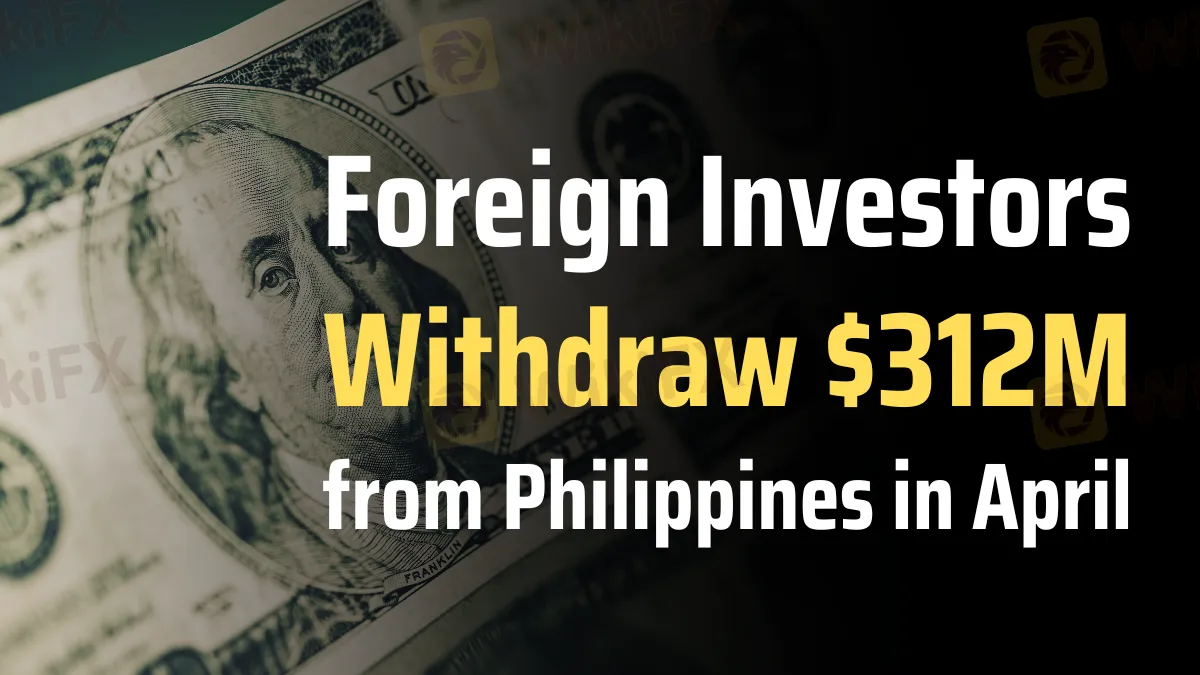简体中文
繁體中文
English
Pусский
日本語
ภาษาไทย
Tiếng Việt
Bahasa Indonesia
Español
हिन्दी
Filippiiniläinen
Français
Deutsch
Português
Türkçe
한국어
العربية
Foreign Investors Withdraw $312M from Philippines in April
Abstract:Foreign investors pulled $312M from the Philippines in April, a rise from March's $236M, says BSP. However, net inflows were seen over the first four months.

In April 2024, the Philippines suffered a substantial outflow of foreign portfolio investments, sometimes known as “hot money,” with net withdrawals totaling $312 million. This amount, announced by the Bangko Sentral ng Pilipinas (BSP), is up from the $236 million net outflows recorded in March. Despite the monthly rise, the year-on-year comparison reveals that net outflows are down from $352 million in April 2023.
The phrase “hot money” refers to foreign funds that are briefly invested in stocks and money markets to profit from short-term profits. The transactions involving these assets, which are registered via authorized agent banks (AABs), indicated total outflows of $1.2 billion and gross inflows of $914 million in April 2024.
When viewed over a longer period of time, the BSP data revealed a mixed picture. In the first four months of 2024, the Philippines received net inflows of $65 million. This is a significant increase from the $680 million net outflows over the same time in 2023.
Of the $914 million in registered investments for April, 59.5%, or $544 million, went to Philippine Stock Exchange-listed stocks. The remaining 40.5%, or $370 million, was invested in peso-backed securities. The bulk of these investments came from the United States, the United Kingdom, Singapore, Luxembourg, and Hong Kong, accounting for 87.9% of the total inflows.

In April, gross withdrawals were $1.2 billion, a 25.4% decline from $1.6 billion in March. The United States was the biggest beneficiary of these outflows, receiving $527 million, or 43% of total external remittances.
The statistics revealed that registered investments increased by 28.2% year on year, from $713 million in April 2023 to $914 million in April 2024. Simultaneously, gross outflows increased 15.1% from $1.1 billion the previous year.
The BSP's guidelines on foreign currency transactions make declaring inbound foreign investments via AABs optional. However, it becomes important if the investor intends to acquire foreign currency from AABs or their subsidiary/affiliate foreign exchange firms in order to repatriate money and remit profits. Without such registration, foreign investors may still repatriate cash and remit profits, but the foreign currency must be obtained outside of the banking system.
Despite the hard month of April, the overall foreign investment picture for the year to date has been favorable, with net inflows signaling a possible rebound and restoring confidence in the Philippine market. The central bank's surveillance, as well as the changing dynamics of global financial movements, continue to shape the country's investment climate.
Also, check the latest news on the financial market here.

Disclaimer:
The views in this article only represent the author's personal views, and do not constitute investment advice on this platform. This platform does not guarantee the accuracy, completeness and timeliness of the information in the article, and will not be liable for any loss caused by the use of or reliance on the information in the article.
Read more

Authorities Alert: MAS Impersonation Scam Hits Singapore
MAS scam alert: Scammers impersonate officials, causing $614K losses in Singapore since March 2025. Learn how to spot and avoid this impersonation scam.

Billboard Warns of Crypto Scams Using Its Name – Stay Alert!
Billboard warns against fake crypto scams using its brand. Learn how to spot fraud and protect yourself from fake promotions.

The Impact of Interest Rate Decisions on the Forex Market
Interest rate changes determine currency attractiveness, influencing capital flows and exchange rate trends. Understanding this mechanism helps investors navigate the forex market effectively.

Rising WhatsApp Scams Highlight Need for Stronger User Protections
UK consumers lose £2,437 on average to WhatsApp scams. Revolut demands stricter verification and AI monitoring to combat rising fraud on Meta platforms.
WikiFX Broker
Latest News
TradingView Brings Live Market Charts to Telegram Users with New Mini App
Trump tariffs: How will India navigate a world on the brink of a trade war?
Interactive Brokers Launches Forecast Contracts in Canada for Market Predictions
Authorities Alert: MAS Impersonation Scam Hits Singapore
Stocks fall again as Trump tariff jitters continue
INFINOX Partners with Acelerador Racing for Porsche Cup Brazil 2025
Regulatory Failures Lead to $150,000 Fine for Thurston Springer
April Forex Trends: EUR/USD, GBP/USD, USD/JPY, AUD/USD, USD/CAD Insights
March Oil Production Declines: How Is the Market Reacting?
Georgia Man Charged in Danbury Kidnapping and Crypto Extortion Plot
Currency Calculator







